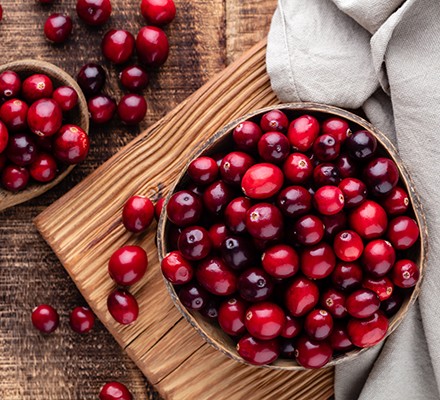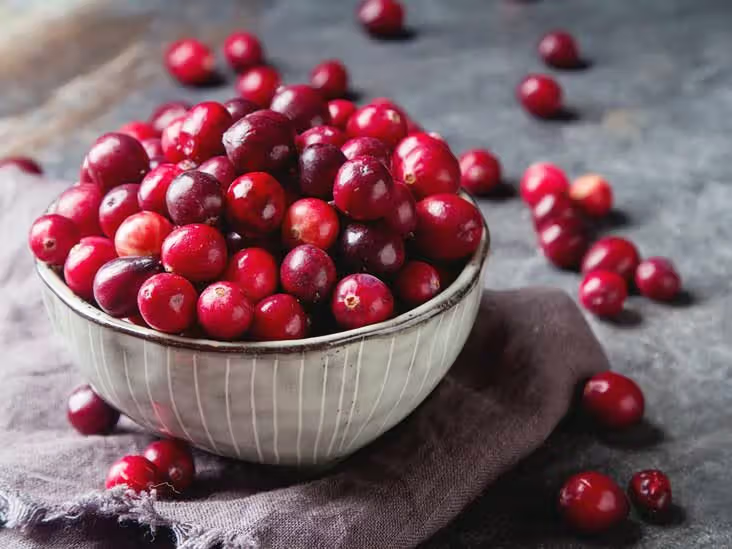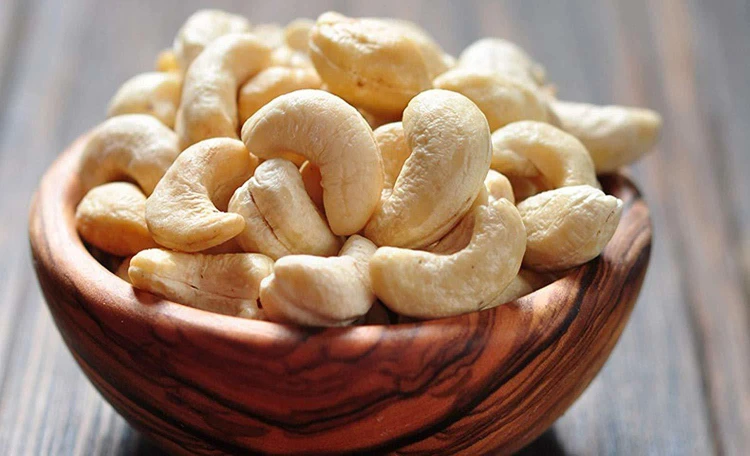advantages of cranberries
Health Benefits of Cranberries : Cranberries are small, hard, round, red fruits known for their bitter or tart flavor. They’re widely thought to be a Thanksgiving must-have but are also used in sauces, juices, muffins, and more throughout the year.
Cranberries are native to North America. They now grow on around 58,000 acres of farmland across the northern United States, Chile, and Canada.

Many people consider cranberries to be a superfood due to their high nutrient and antioxidant content. In fact, research has linked the nutrients in cranberries to a lower risk of urinary tract infection (UTI), the prevention of certain types of cancer, improved immune function, and decreased blood pressure.
CHECK HERE : Health Benefits Of Dry Apricots
The health benefits of cranberries include:
• Rich in antioxidant compounds
• May prevent urinary tract infections
• May have anti-aging properties
• May promote skin health
• May support heart health
• May help reduce the risk of stomach ulcers
• Antibacterial properties
• May protect against certain cancers
• May support eye health and vision
• May promote a healthy immune system
Packed with antioxidants
Cranberries are well known for being rich in antioxidants. One study found that among 20 common fruits, cranberries have the highest level of phenols, a type of antioxidant.
The anthocyanins found in cranberries may have anti-cancer and anti-inflammatory effects. They may also:
• Protect against liver disease
• Lower blood pressure
• Improve eyesight
• Improve cardiovascular health
Better oral health
Cranberries can help keep your mouth healthy. They lessen the amount of acid in your mouth and stop it from sticking to your teeth. In addition, they contain chemicals that prevent bacteria from collecting on your teeth. This can help stop cavities, gum disease, tooth decay, and even oral cancer.
Cranberries for digestion
Cranberries can improve your gut health in several ways. For example, they get rid of bile acids linked to colon and gastrointestinal cancers. If you eat a lot of meat, dairy, and sugar, these little fruits can help put good bacteria back into your digestive system.
Also, cranberries might be able to stop a bacteria called Heliobacter pylori, which causes ulcers, from latching onto the walls of your stomach. However, more research is needed to be sure.
Cranberries for urinary tract infections (UTIs)
Although cranberries won’t cure a urinary tract infection (UTI) after it starts, studies show they can help preventUTIs, especially in people who get them often. That’s because the proanthocyanidins in cranberries stop some bacteria from attaching to the walls of your bladder.
If you get frequent UTIs, your doctor may suggest you to take them as supplements or drink cranberry juice from time to time.
If you think you have a UTI, talk to your doctor about whether you might need antibiotics.
Reduced inflammation
The antioxidants in cranberries are anti-inflammatory powerhouses. Keeping inflammation levels low can help prevent chronic diseases such as cancer and diabetes.
Cranberries and cancer
The great amount of antioxidants found in cranberries, such as proanthocyanidins, could help lower your chance of getting cancer. However, more research is needed to confirm this.
Protection against germs
Cranberries can fight off common bacteria such as Escherichia coli (E. coli) and Listeria monocytogenes. Some research suggests that they could even fight viruses, but more studies are needed.
Reduced risk of cardiovascular disease
Cranberries have two big benefits for heart health: lowering blood pressure and improving cholesterol. Some studies suggest that drinking low-calorie cranberry juice regularly can raise HDL (good) cholesterol and lower LDL (bad) cholesterol.
Cranberry benefits for skin
Cranberries are packed with vitamin C, which is an important nutrient for skin health. Some dermatologists recommend vitamin C creams to boost collagen levels, reduce inflammation, brighten dark spots, and protect from UV rays.
May have anti-aging properties
Cranberries are one of only a few fruits that are high in plant defence chemicals called pro-anthocyanidins. Most of the studies regarding cranberries have focused on the benefit of these compounds on urinary health, however, other research suggests their benefits may stretch to protecting against collagen degradation in the skin and cognitive decline. Much of the data to date has been obtained from animal studies, using pro-anthocyanidins from other plant sources, so more trials are needed in this promising area.
May support heart health
A number of human studies state regular consumption of cranberry juice or extract may reduce some of the key risk factors for heart disease. These include improving cholesterol balance, lowering blood pressure and reducing a compound called homocysteine, which is known to damage the lining of the blood vessels.
It’s worth noting, however, that conflicting findings have been reported in other studies.
May help reduce the risk of stomach ulcers
Cranberries contain a plant compound that may reduce the risk of gastric ulcers and stomach cancer caused by the bacterium Helicobacter pylori. Consuming cranberry products that are naturally rich in this compound (known as A-type pro-anthocyanidins) appears to suppress the growth of the bacteria and as a result may reduce the risk of developing stomach cancer.
ALSO READ : Health Benefits Of Fish Oil





